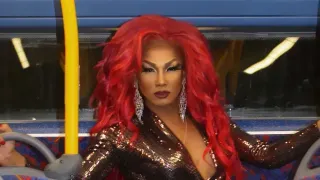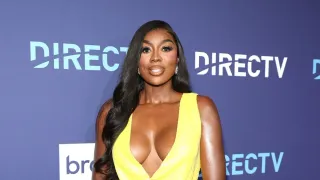
4 hours ago
HS Tikky Tokky Threatens Legal Action Against Fans Over ‘Zesty’ AI Makeup Clips
READ TIME: 3 MIN.
HS Tikky Tokky—real name Harrison Sullivan—has become the center of an internet firestorm after dozens of AI-generated videos surfaced online depicting him with full makeup, feminine features, and, in some clips, alluding to coming out as gay. The influencer, known for his motivational content and bold online persona, reacted swiftly and publicly, threatening legal action against those responsible for producing and sharing the content .
The controversy began when deepfake-style videos, created using advanced artificial intelligence tools, started circulating widely on TikTok and X (formerly Twitter). These clips featured highly realistic images of Sullivan wearing pink lipstick, winged eyeliner, and false lashes, often while lip-syncing lines reminiscent of his actual videos. Some viewers admitted to believing the footage was real at first glance, a testament to the increasing sophistication of AI media manipulation .
The content quickly went viral, with reactions ranging from amusement and admiration for the technical skill involved to concern about privacy and digital identity. “I actually thought this was real,” commented one user, while others described the edits as “funny” or “creative.” However, not everyone was amused, least of all the influencer himself.
Sullivan addressed the situation directly via his Instagram Story, calling the videos “disrespectful” and emphasizing that he never gave consent for his likeness to be used in this way. “These weirdos are making AI versions of me wearing makeup. I never gave consent to this,” he wrote. He went on to say, “I’ve already spoken to my team and we’re suing every single one involved” .
While no formal lawsuits have been filed as of this writing, sources close to Sullivan confirm that he has contacted both his management and legal team to explore options for recourse. The influencer insisted that the issue was not about the makeup itself, but rather about the principle of consent and the right to control one’s image: “You can’t just create fake versions of people and post it for clout. If I wanted to wear makeup, I’d post it myself. Don’t play with my image” .
The response from fans and the broader online community has been mixed. Some sympathized with Sullivan, arguing that AI deepfakes represent a dangerous overreach and pose real risks to personal privacy and digital identity. Others dismissed the controversy as an overreaction, pointing out that parody and creative edits are a longstanding part of internet culture. “It’s literally AI. Everyone’s been edited or face-swapped at this point,” wrote one TikTok commenter.
A growing contingent of social media users, however, have begun to question where the line should be drawn between legitimate parody and non-consensual digital manipulation. As one user on X put it, “It’s not about makeup, it’s about people taking your image and creating false narratives. That’s scary” .
The HS Tikky Tokky incident is not an isolated one. The rapid advancement of AI-powered editing tools has made it increasingly easy to create lifelike but fabricated images and videos of public figures. Just last month, another UK influencer was similarly deepfaked, with clips spreading widely and blurring the line between fiction and reality.
As of now, there is no clear legal consensus on how to handle deepfakes or AI-generated likenesses, particularly when they intersect with parody and satire. Some countries have begun drafting legislation aimed at curbing non-consensual deepfakes, especially those of a sexual or defamatory nature, but enforcement remains inconsistent.
Social media platforms, including TikTok and Instagram, have policies against impersonation and harassment, but the rapid spread of viral content often outpaces moderation efforts. Influencers and activists alike are calling for stronger protections and clearer reporting tools to help users defend their digital identities.
Within LGBTQ+ circles, reactions to the HS Tikky Tokky controversy are nuanced. Many point out that makeup and gender expression are not inherently linked to sexual orientation, and that using AI to “out” someone or assign them a queer identity without consent is both unethical and potentially dangerous. Others stress that while creative expression online is valuable, it must not come at the expense of someone’s autonomy or sense of safety.
As AI-generated content becomes ever more realistic and accessible, public figures and private individuals alike face mounting challenges in protecting their images and narratives. The HS Tikky Tokky incident has crystallized many of these debates, prompting calls for clearer guidelines, stronger legal protections, and a more inclusive understanding of digital consent.
Whether or not Sullivan follows through with legal action, the viral moment has become a flashpoint in ongoing conversations about privacy, consent, and LGBTQ+ representation in the era of artificial intelligence. As online culture continues to evolve, so too must the frameworks that safeguard the dignity and identity of all individuals, regardless of how they express themselves—or are depicted—online.






